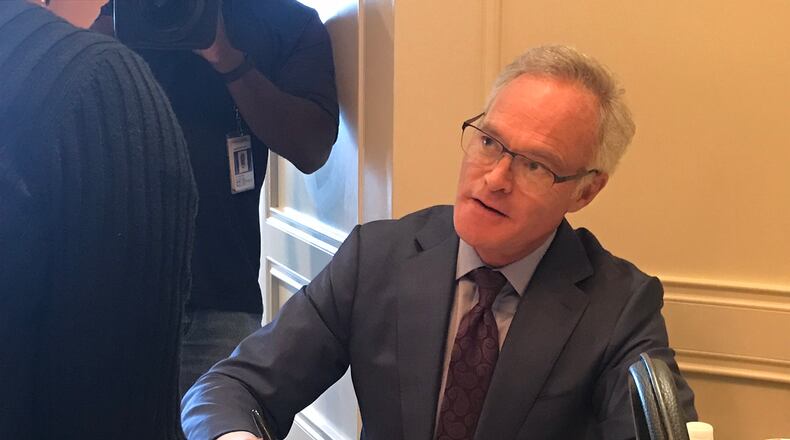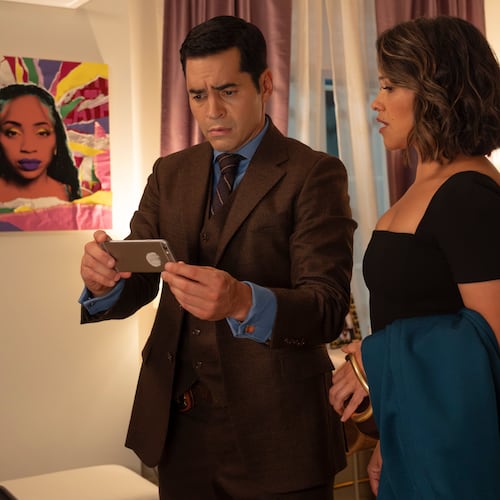Originally posted Saturday, May 24, 2019 by RODNEY HO/rho@ajc.com on his AJC Radio & TV Talk blog
Veteran "60 Minutes" correspondent and former "CBS Evening News" anchor Scott Pelley has reached the age where a memoir is almost de rigueur.
But the 62 year old never found his own life so fascinating that it merited 500 pages. So he took a different tact: his book "Truth Worth Telling" is a series of essays shining the light on fascinating subjects he has covered over the decades, a blend of famous and unheralded.
He recounts stories of survivors of the 2010 Deepwater Horizon oil rig explosion, parents of victims of the 2012 Sandy Hook school massacre and 9/11 firefighters facing imminent death.
“I was there watching members of the fire department charge up those stairwells [of the World Trade Center] knowing that there was enormous risk to their own lives,” said Pelley at the Atlanta Press Club Newsmaker luncheon Thursday at the Commerce Club. “Why did they do what they did? It’s because there was a chance they could save someone else.”
Of course, nobody knew the buildings would collapse on themselves. He spent days chronicling the tragedy amid 96 straight hours of commercial-free CBS News coverage.
"This great news organization created by Edward R. Murrow leading up to World War II, everything we had done through Walter Cronkite and Dan Rather. Everyone, every person, every producer, for those 60 years had led to that day. I believe 9/11 was CBS's finest hour."
The book is broken up into virtues such as gallantry and courage. He told the story of a dissident Bao Tong, who was jailed for years over his support of students protesting in Tiananmen Square. In 1998, he had been released but was under heavy surveillance.
Yet Bao showed enough bravery to meet with Pelley to talk about how he felt China didn’t support its own constitution. They were in a park where the people weren’t allowed on the grass. After they went their separate ways, Pelley saw a man yelling at him. He walked briskly, then jogged, then ran. The translator told him that the man wasn’t trying to arrest them; rather, he was yelling at them to keep off the grass.
In a separate interview after the luncheon, I asked him about some other topics:
Was he surprised that there are still so many young people interested in entering journalism when the business model is so fraught with issues:
“I’m not surprised because I think most Americans understand that there’s no democracy without journalism. And that in order for any democracy to function at all, the American people have to have independently reliable information. A lot of the people are interested in being part of it.”
How did Pelley get caught up in journalism? Was it Watergate?
“I was really interested in photography as a teenager. I got a job at a local newspaper in Lubbock [Texas]. I was the Lubbock Avalanche copy boy. I wanted to work in the dark room someday and work with the photographers. I was desperate and I had a problem. They only hired you if you were at least 16. I was 15. So my career in pursuing the truth began with a lie. I fibbed about my age. I became a photographer after a year as a copy boy. An executive at the paper then came to me and asked if I wanted to be a reporter. I said, ‘Well, I don’t know. I never gave it any thought.’ ‘Do you or don’t you?’ ‘Sure, I guess.’ He sat me down in front of a typewriter and I’ve been reporting ever since.”
His photography hobby continues in the field:
“It’s really an intense hobby for me. One of the wonderful things about working at ‘60 Minutes’ is having a chance to go to exotic places around the world and see unusual cultures. I always bring a big case and camera and lens. I work pretty hard at it.”
Watching his own cameramen:
"It really helps me appreciate what our brilliant cameramen do at '60 Minutes.' They are more exposed, more encumbered. It is the job of the correspondent and producer in hazardous situations to watch out for the cameramen. He has a blind side because of the camera on his shoulder. We pay a lot of attention to watch literally the backs of our cameramen in a combat zone or hurricane. One of my favorite cameramen Paul Douglas was killed by a car bomb in Iraq. I was not with him. I'd known him for a long time. The risks are real. CBS News has lost 17 people in the line of duty. I've always kept their photographs on the set of CBS Evening News in tiny frames. You couldn't see it as viewers but everyone in the newsroom knew they were there. We didn't want to lose focus of their sacrifices."
On Steve Kroft retiring at age 72:
"It was a complete surprise. I have since talked to Bill Owens, the executive producer of '60 Minutes.' He told me that he had known for a couple of years. Steve was thinking very seriously about retiring. He's been with '60 Minutes' for 30 years. That's something like 600 stories, an absolutely brilliant career. I don't blame him for a second for wanting to take the next few years with his wife and have some fun. He has earned it. We're going to miss him."
Will Pelley last another decade or more?
“I don’t know. Andy Rooney worked until he was over 90. I have his typewriter in my office. His family gave it to me. It’s a 1913 Underwood Model 5, a manual. Andy would buy one every time he could find one in an antique store. He never wrote on anything else. He never touched a computer. It’s a cherished possession.”
On new CBS News president Susan Zirinsky:
“I’ve known her all 30 years I’ve been here. She’s been here more than 40 years. Dan Rather used to joke that Susan was delivered straight from the hospital to the CBS newsroom. She grew up there. She was a real creative force. I could no be more excited to have CBS News in the hands of Susan Zirinsky. She has CBS News DNA. There could not have been a better choice.”
On Norah O'Donnell as new "CBS Evening News" anchor:
“I think Norah is uniquely suited for the evening news job. She’s a terrific journalist, a terrific reporter. One of the things an audience may not realize is that leadership ability is important for that job. You end up being the leader of all these people around the world who are working for the evening news. She’s going to lead this cast to great things.”
Credit: CBS News
Credit: CBS News
The import of the evening news in 2019:
“There’s a problem with 24-hour news on cable or online. There isn’t really 24 hours worth of news so they end up talking for hours and hours on end chewing over things and not really illuminating the issues. The beauty of the evening news broadcast is it’s a curated 30 minutes. We’re not wasting your time. We worked all day to bring you the 10 most important things that happened today. And you don’t even have to be home at 7 o’clock to see it. It’s online and it’s streaming.”
The enduring popularity of “60 Minutes”:
“It’s going into its 52nd season next year, the most successful television programming in prime time. It’s become an American tradition. If I may say so with humility, it’s become an American asset to the nation. People have turned to it for decades now for solid, reliable information. And the beauty of our stories is they are many times longer than what you would see on cable news or the evening news. We can really dig into them and give stories a lot of depth and balance. The audience clearly is still hungry for that.”
How football almost always delays the start of ‘60 Minutes’:
“I always advise people to record ‘60 Minutes’ and the show after that. On a garden variety week, we’ll have 12 million viewers. After football, we get 15-16 million. It’s one of the thing that keeps us on the air. Everyone always tells me how they hate the football. But it’s one of the things that keeps us strong!”
ABC has counter-programmed with “America’s Funniest Home Videos” - for 30 years:
“Here’s the business decision you have to make. If you’re going to go up against ‘60 Minutes,’ you don’t want to spend a lot of money. What you need is cannon fodder. Because whatever you put up against us will get crushed. It tends to be programming that doesn’t take a great deal of production money.”
How he got onto “60 Minutes”:
“I was chief White House correspondent for two years. They decided to start the new ‘60 Minutes II.’ If something is successful, you imitate it. I did that for six seasons. Then they decided to retire that and asked me to join Sunday. It was the biggest day of my career no doubt. I think that was the thing that made me the journalist I am today. I was kind of free to pick my own stories and travel the world.”
Will they ever change the analog clock on “60 Minutes” when kids can’t even read analog clocks?
“That is a really interesting challenge. We have no intention of changing the stopwatch, no discussion whatsoever. A lot of younger viewers have never seen an analog stopwatch or anything that goes tick, tick tick. It’s too iconic to change. It’s like a Coke bottle. You can’t mess with that. On the other hand, it is sort of antiquated. It’s an interesting problem.”
DISCLOSURE: I am a board member of the Atlanta Press Club, which hosted the Scott Pelley newsmaker luncheon.
About the Author
Keep Reading
The Latest
Featured







